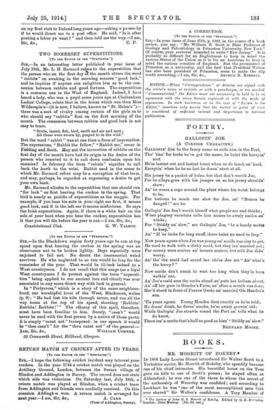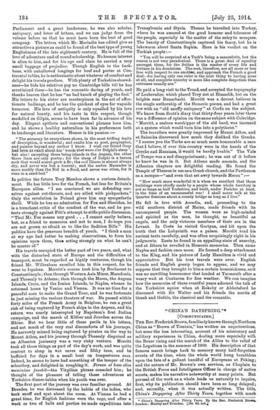BOOKS.
MR. MORRITT OF ROKEBY..
IN 1808 Lady Louisa Stuart introduced Sir Walter Scott to a Yorkshire squire, Mr. Morritt of Rokeby, who speedily became one of his chief intimates. His beautiful home on the Tees are its title to one of Scott's poems ; he stayed often at Abbotsford; he was one of the three to whom the secret of the authorship of Waverley was confided ; and according to Lockhart he was "one of the most accomplished men that ever shared" Sir Walter's confidence. A. Tory Member of
• The Lettere of John B. S. Merritt of Bokeby. Edited by G. E. Br..-indin„ London : John Murray. [10s. 84. net.]
Parliament and a great landowner, he was also scholar, antiquary, and lover of letters, and we can judge from the volume before us that he must have been the best of good company. The letters which Mr. Marindin has edited give as attractive a picture as could be found of the best type of young Englishman of the late.eighteenth century. He is full of the love of adventure and of sound scholarship. No human interest
is alien to him, and for his age and class he carried a very small baggage of prejudice. Though English to the back-
bone, with unhallowed longings for beef and porter at Con- tinental tables, he is enthusiastic about whatever of comfort and
delight his travels produce. With plenty of Yorkshire shrewd- ness—he bids his relatives pay no Cambridge bills till he has scrutinized them—he has the romantic daring of youth, and thanks heaven that he has "no bad knack of playing the fool." His letters to his sister are masterpieces in the art of affec- tionate badinage, and he has the quickest of eyes for wayside humours. His love of antiquity is only equalled by his love for natural beauty, and his taste in this respect, though modelled on Gilpin, seems to have been far in advance of his clay. Elegant epithets and conventional phrases bore him, and he shows a healthy naturalism in his preferences both in landscape and literature. Homer is his passion The accuracy he everywhere shows, in the most trifling traits of description, is wonderful ; and exalts him as poet, geographer, and painter beyond any author I know. I wish our friend Gray had been as exact about his 'woods that wave o'er Delphi's steep ' ; but alas ! excepting there being islands in the Aegean, the other -three lines are only poetry; for the steep of Delphi is a barren rock that would scarce grow a fir; the cool Dissus is almost always dry, and never was but a torrent; and the amber Maeander is more muddy than the lid in a flood, and never was other, for it runs in a sand-bed."
In politics the future Tory Member shows a curious detach- ment. He has little love for the French, but less for Britain's European allies. "I am convinced we are defending our-
selves against cut-throats, and are allied with pickpockets." Only the revolution in Poland gives him any sympathetic thrill. While he has no admiration for Fox and Sheridan, he is a trenchant critic of the conduct of the war, and he pro- tests strongly against Pitt's attempt to stifle public discussion.
-" That Mr. Fos means any good . . . I cannot easily believe, but, as a friend to measures and not to men, I do hope you are not grown so afraid as to like the Sedition Bills." His politics have the generous breadth of youth. "I think a man at my age had better be making observations, to form his opinions upon them, thatt acting strongly on what he can't be master of."
His travels occupied the better part of two years, and, what with the disturbed state of Europe and the difficulties of transport, must be regarded as highly venturous, though his friend Mr. Wilbraham excelled him in this respect, for he went to Ispahan. Morritt's course took him by Bucharest to
Constantinople; then through Western Asia Minor, Macedonia, and Thessaly to Athens; then through the Morea, the Aegean Islands, Crete, and the Ionian Islands, to Naples, whence he returned home by -Venice and Vienna. It was no time for a peaceful man to make the Grand Tour, and he was fortunate in just missing the various theatres of war. He passed within forty miles of the French Army in Belgium, he ran a great risk of being captured by French ships in the Aegean, and his return was nearly interrupted by Napoleon's first Italian campaign, and the march of Kldber and Jourdan across the Rhine. But we hear little of these perils in his letters, and not much of the very real discomforts of his journeys. He narrowly missed being captured by pirates on the way to Mount Athos, and his journey through Thessaly disguised as an Albanian janissary was a very risky venture. Morritt took all these things as part of the day's work, and was quite content to sleep in wet caves and filthy inns, and be buffeted for days in a small boat on tempestuous seas. Indeed, he seems to have had something of the temper of the schoolboy, and delighted in roughing it. Forsan et haee olint meminisse juvabit—the Virgilian phrase consoled him; he thought of the pleasure of telling these adventures at Yorkshire dinner-tables when his youth was over.
The first part of the journey was over familiar ground. At Dresden he was distressed by the habits of the ladies, who took snuff and spat about the room. At Vienna he had a great time, for English fashions were the rage, and after a week or two of balls and parties he made expeditions into
Transylvania and Styria. Thence he travelled into Turkey, where he was amazed at the good humour and tolerance of the people, especially in the matter of the entry to mosques. The beauty of Constantinople captured his fancy, but he is lukewarm about Santa Sophia. Here is his verdict on the Turkish people :—
" You will be surprised at a Turk's being a sanscnlotte, but the reason is not very paradoxical. There is a great deal of equality amongst them, for the Sultan is the master of every life and fortune in his dominions. The rest, therefore, are all more or less free with respect to one another, and approach the French a good deal—for having only one ruler is the next thing to having none at all, and complete anarchy is more like complete despotism than extremes usually are."
He paid a long visit to the Tread, and accepted the topography of Lechevalier, which placed Troy not at Hissarlik, but on the heights near Bunarbashi. Morritt was a devout believer in the single authorship of the Homeric poems, and had a great row with an "old snuffy antiquary" at Corfu on the subject. We know from Scott's diary that thirty-four years later there was a difference of opinion on the same subject with Coleridge. "Morritt, a zealous worshipper of the old bard, was incensed at a system which would turn him into a polytheist."
The travellers were greatly impressed by Mount Athos, and at Salonika discovered how much they disliked the Greeks. "I assure you the Turks are so much more honourable a race
that I believe, if ever this country were in the hands of the Greeks and Russians, it would be hardly livable." The Vale
of Tempe was a sad disappointment ; he was out of it before he knew he was in it. But Athens made amends, and the Athenian chapters are delightful reading. He found the Temple of Theseus in use as a Greek church, and the Parthenon as a mosque—" and even that set awry towards Mecca"
"How much more wonderful it is when we recollect that these buildings were chiefly made by a people whose whole territory is not so large as half Yorkshire, and built, under Pericles at least, in the time of an unsuccessful war! I shall never talk at the Quarter Sessions about a county bridge as long as I live."
He fell in love with Arcadia, and, proceeding to the wild southern district of Maim, made friends with its unconquered people. The women were as high-minded and spirited as the men, he thought, as beautiful as angels, and the only virtuous members of their sex in the Levant. In Crete he visited Gortyna, and hit upon the truth that the Labyrinth was a palace. Morritt read his ancient texts carefully, and was often surprisingly right in his judgments. Zante he found in an appalling state of anarchy, and at Ithaca he revelled in Homeric memories. Then came Naples and fashion once more. He formed a deep attachment to the King, and his picture of Lady Hamilton is vivid and appreciative. But his true travels were over. English friends and English gossip began to appear, and we may suppose that they brought to him a certain homesickness, so it was no unwilling homeowner that landed at Yarmouth after a: weary wait at Cuxhaven for fine weather. We can imagine. how the memories of those eventful years adorned the talk of the Yorkshire squire when at Rokeby or Abbotsford he discussed with Sir Walter and his friends the merits of Greek and Gothic, the classical and the romantic.







































 Previous page
Previous page